Search Results for Tag: bicycle
All routes headed for Frankfurt
This is the third guest post as part of our series accompanying the WWF Youth Bike Tour this summer. Still having sore muscles from the previous day’s leg Tamara Nausner and her fellow cyclists lost little time to ride on to Frankfurt. It was the last stretch for our guest blogger.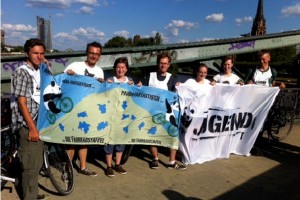
Today is a very special day. The bike tour really are two – one that traverses the country passing through the Eastern states, the other following a route in the West. But both will be merging at the end of today’s stretch. Filled with anticipation we are riding out of Wiesbaden, although our bodies hurt quite a bit. But: no pain, no gain. And after a while I get used to it and can enjoy the journey again along the river Main. I like the route more than the one yesterday because for the most part there is no road and no cars. At one point we even have an abandoned motorway all to ourselves. Some of us are cycling as fast as they can. We are all having fun.
We arrive at Frankfurt quite early. The riders from the Eastern route inform us that they will not be here for another few hours. To pass the time we treat ourselves to ice-cream, play cards and relax in the grass near the Main. Eventually the others arrive. Together we take a picture of the banners of the two teams now united.
For me and some of the others the bicycle relay is over now but the rest will ride on in the spirit of climate-friendly travel. I am so glad I took part and hope that there will be another tour next year. And I also hope that we could help encourage people to think about what they can do to protect our environment.
56 Kilometers turn strangers into friends
This is the second guest post as part of our series accompanying the WWF Youth Bike Tour this summer. Today Tamara Nausner tells us about her day on the road – and that 56 kilometers on a bike need not be the most taxing thing in a day of cycling…
My day starts very early in the morning. Too early. But today there is no time to be tired or lazy. So I’m packing all my luggage onto my bike and ride to the train station. It is so quiet and peaceful at this time in the morning.
Being a little late, my train eventually is on its way to Oberwesel – the starting point for today’s stage of the WWF Youth cycling tour.
What I learn along my journey is that there are no elevators at small stations, so I have to carry my bike up and down the stairs quite a few times. Not that easy with all the luggage.
At half past nine I arrive in the town, which is is located some 80 kilometers West of Frankfurt. I am very excited to meet the two cyclists, who will join me for the tour. And they don’t keep me waiting. I spot them immediately – they are wearing the vests carrying the WWF logo. Then they hand me one, too. Time for a picture of all of us! There is not much around; we eventually opt for an old ruin as a backdrop for our photo.
At last we start day 20 of our tour, which today will bring us to the city of Wiesbaden. But we are not the only ones on the road, framed by vineyards on one side and the river Rhine on the other. Unfortunately there are cars too. So after a while we decide to take a route through the vineyards. There are no other cyclists and no cars. Only a tractor. But very quickly we regret this idea because our path is steeply rising. Eventually we return to our previous route.
The weather is perfect: warm but not too hot, clouds and the sun take it in turns. We enjoy the journey. While riding we get to talk a bit, about everything, and I realize how nice it is to talk to people who have similar interests – protecting the environment being a very big one.
Our destination is getting closer. But before starting off on the final stretch we decide to take a break and have some lunch. That is when I notice for the first time just how tired I am. The rest of the trip is quite tough. Finally we arrive at the train station of Wiesbaden. But even after 56 kilometers on the bike there is no rest for us yet. A photographer is welcoming us, asks for our names and wants to take a couple of pictures. Then, he leaves.
A final short ride along a coarse gravel path to our night quarters turns out to be almost the hardest part of our journey today. But eventually we get there.
The next morning at 10am we are ready for the next leg of our tour. We take a picture and are on our way – to Frankfurt.
From gray to green – biking through Germany’s former industrial heartland
In the second part of our bike blog, Maurice Jurke, who’s part of the WWF’s bike tour across Germany, takes up the story as he encounters some strenuous uphill stretches (the good thing about those, as he points out, is rolling down), sweats it out in the summer heat and cycles through Germany’s former coal-fired industrial heartland which has now been rejuvenated into a green area.
It’s 3:20 pm and I am sitting in a small café in the inner city of Hamm in the western German state of North-Rhine Westphalia. It’s quite well known in Germany and so I expected a big town with and a landscape dominated by the color gray. But as so often this year, I was wrong. Instead, I cycled on a wonderful route from Gütersloh to Hamm.
During the day, I barely rode on streets since a large part of the stretch wound through fields and large forests. I began at 10:15 as usual and I had hoped to arrive after 60 kilometers and 3 1/2 hours. But again I was proven wrong. Literally. I took some wrong turns, and so I had to ride 70 kilometers over several mountains, and arrived after 4 hours. Still a good number, but I was not very happy with my day. It was too hot and I am really thankful for my ice cream and my ice-cooled coke which I’m sipping at the moment. Still, it was a good day, it just could have been better. Well, I hope you had a perfect day. Me? I’m going to take a bath to cool down some more.
Let’ s go gray…uhh I mean green
Another day of biking through Germany and the direction is still south-west. From Hamm, we passed Dortmund and Duisburg, and now we’re visiting Langengeld, a small village at the border of Düsseldorf.
In the last three days, we’ve cycled past plenty of places in Germany’s old industrial heartland in the west. It’s called the Rhein- and Ruhrgebiet in German. There you’ll find big industrial companies and lots of mines and old coal pits. As Germany tries to change its energy policy, increasingly moving away from fossil fuels and towards renewable energy, coal is no longer a big player.
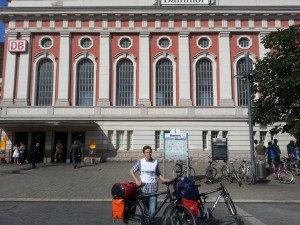 So you’ll find many old, abandoned and derelict coal mines. In some of these places, city authorities are trying to transform them into old people’s homes. Once gray and polluting, these unpopular mines are being upcycled and are a jewel in the inner cities.
So you’ll find many old, abandoned and derelict coal mines. In some of these places, city authorities are trying to transform them into old people’s homes. Once gray and polluting, these unpopular mines are being upcycled and are a jewel in the inner cities.
That means almost our entire bike route now goes through parks or forests, occasionally cut by some highways or an inner city. Germany, in this regard, has developed well, we think.
And here’s a personal question: what do you think of this development in Germany’s former industrial areas? Have the cities been successful? Would you want to live in this former gray area, which has now painted itself in green?
Pushing the pedals for the environment
Over four weeks, from July 21 to August 17, members of the youth organization of the World Wildlife Fund (WWF) in Germany will be cycling across the country and covering hundreds of kilometers to raise awareness about climate and environment protection. Some of the young participants will be writing for GLOBAL IDEAS from on the road with their impressions and experiences. First off, 19-year-old Denis Mesterharm, a keen environmentalist. He had to cope with a broken bike, scorching heat and an uphill ride – and all that in just the first week.
Hello everybody and welcome to the first blog article about the “WWF-Jugend Fahrradstaffel”. First, off, what exactly is a “Fahrradstaffel?” Literally translated, it’s a bicycle relay. Members of the World Wildlife Fund’s youth organization are riding their bikes from Flensburg (in northern Germany near the border to Denmark) to Freiburg (in the south of Germany near the Swiss border). It’s a 2,210-kilometer route. The aim is to raise awareness about the need to protect the climate and to promote the environmental benefits of pushing the pedals rather than taking the car, especially for short distances in daily life.
This year, there are two routes. The West route goes through the cities such as Hamburg, Hanover and the former capital Bonn. The eastern stretch will take us to Leipzig, Erfurt and the capital Berlin. Both routes will converge in Frankfurt and end in Freiburg.
And now, to the first week where I took part. The first five stages were in Schleswig-Holstein, the northernmost state in Germany. Flensburg, the start city, is located on the “Flensburger Förde,” a fjord of the Baltic Sea. The first day was catastrophic. My bicycle broke down after just a few kilometers. The bike tube exploded and so I had to cancel the first stage.
But day two was better. From Eckernförde to Preetz via Kiel –capital of Schleswig-Holstein – that was the route. It was a bright sunny day without any problems. So I started Day 3 happily to this stage. Now I had to ride to the Hansa League City, Lübek. But this stage was more difficult than the last one. There were many more hills and lakes that made the route over 60 kilometers long. Normally I’ve had to ride 45-50 kilometers each day. Besides, it was hugely hot on the day and I forgot to take enough to drink with me.
Luckily, that problem didn’t present itself the next day because the route from Lübek to Büchen involved cycling through a big forest for most of the way and I had enough to drink with me.
But on day five, I forgot my camera at home, so I wasn’t able to take any photos on the way to Hamburg. Fortunately, the stretch wasn’t that scenic because much of it led through the city.
Day 6 was my last day on the road. From Hamburg to Lüneburg. On this stage, I crossed the Elbe river on a ferry at “Zollenspieker.” It’s an ancient customs post in Hamburg dating all the way back to the Middle Ages.
Upon arriving in Lüneburg, I handed over the WWF baton, some bicycle flags and one big flag, to the service point of the German railway (Deutsche Bahn). They were to hand it over the next day to the next member of our bicycle relay who finished the stretch. Thanks for reading this blog and watch this space for further entries from other bloggers from the bike relay.
Superhero of bicycles
Author: Kerstin Schnatz
Ever heard of a bike-a-lator? If your answer is “No” we highly recommend you to visit the library of solutions on www.bikestorming.org. Mati Kalwill from Argentina launched the online platform at the Rio+20 summit, the United Nations Conference on Sustainable Development.
“Instead of protesting against people using cars, we celebrate what we stand for. So we take the best of a party and the best of a bike ride to combine it to a bike party.” To support Mati and his team from La Vida en Bici (Life on Bike) one of the hottest clubs in Buenos Aires even put up a VIP bike rack in their entrance hall. Mati loves the fact that “when you come on your bike, you don’t just get into the club more easily, but you also get free and save parking.” Through www.bikestorming.org, he is hoping to share good ideas like these with the world.
Climate Champion
The bike activist’s trip to Brazil was sponsored by the British Council who elected him for their Climate Champion programme. The project supports young people around the globe who tackle global warming.
Climate Champion Mati already accomplished his first mission: The final document of the Earth Summit includes a recommendation to strengthen cycling infrastructure in cities around the world.
How to make UN conferences more bike friendly?
“When I first came to the conference center on my bike, I was surprised there weren’t any bike racks.” Mati admits that even with more bike racks most conference visitors would probably still take a shuttle bus to get to the Summit.
Bike lanes do not exist on the outskirts of Rio where the Earth Summit is taking place making cycling a dangerous sport. “But you need to start somewhere.” Mati smiles knowingly. While he is speaking to us, a new bike rack is set up outside the huge congress center “Riocentro” – thanks to his campaigning.
Mati is dreaming about his next action at the COP 18 Climate talks in oil-rich Qatar this December: “Of course I hope that our goal of 51% of city trips made on bikes rather than cars will be reached before 2030. But if we can make the next big UN conference more bike friendly, this would already be a big step into the right direction.” For his trip to Qatar, he hopes for the support of the British Council’s Climate Champion programme once again.
Mati’s new online platform is a wiki where everyone can post good ideas on how to get more people to ride a bike rather than driving cars: ww.bikestorming.org. If you have a great project for a greener world yourself check out the British Council’s Climate Champion programme.





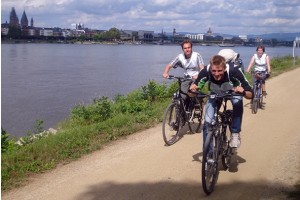
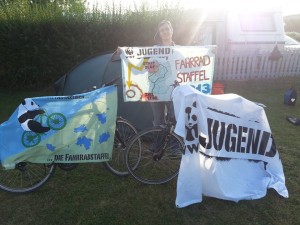
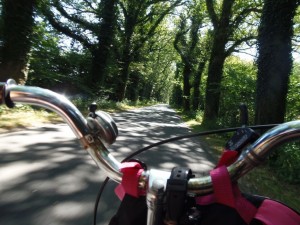


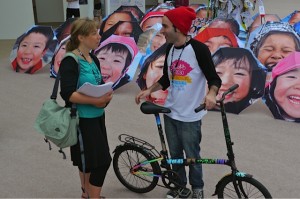
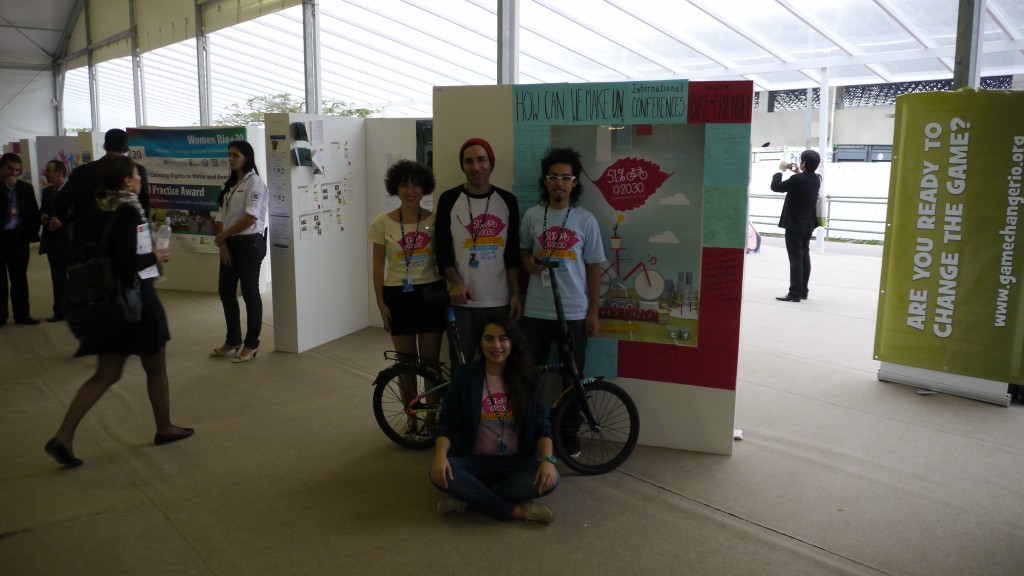
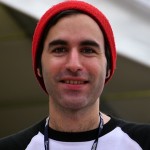
Feedback